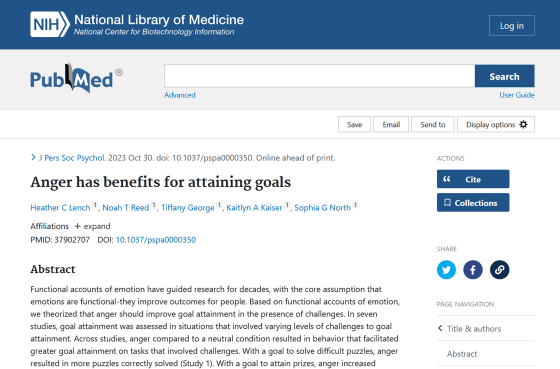Research shows that angry people are better able to solve difficult tasks than normal people

Many people believe that it is important to remain calm and calm without getting emotional when tackling difficult problems. However, in an experiment conducted by a research team at
Anger has benefits for attaining goals - PubMed
https://pubmed.ncbi.nlm.nih.gov/37902707/

Want to achieve your goals? Get angry
https://www.apa.org/news/press/releases/2023/10/angry-goals
Anger can lead to better results when negotiating tricky tasks – study | Psychology | The Guardian
https://www.theguardian.com/science/2023/oct/30/anger-can-lead-to-better-results-when-tackling-tricky-tasks-study
Positive emotions such as happiness and joy are important for mental health and well-being, and many people think that they want to avoid experiencing negative emotions such as anger and sadness as much as possible. 'People often believe that a state of well-being is ideal, and see the pursuit of happiness as their primary goal in life,' said Heather Wrench, Ph.D., a psychology and neuroscientist at Texas A&M University and lead author of the study. Most people think about it.”
However, based on functionalism , which holds that human emotions and consciousness have some function or purpose, negative emotions are not unnecessary for humans, but are necessary to encourage specific actions. You can For example, sadness may indicate that you need some help or emotional support, while anger may indicate that you should take action to overcome an obstacle.

Lenzi's research team conducted multiple experiments with more than 1,000 subjects to investigate how specific emotions they had affected their ability to perform specific tasks. Did. In one experiment, subjects were shown images that have been shown to evoke emotions such as anger, joy, desire, and sadness, and then were asked to ``solve word puzzles of varying difficulty'' and ``simulate ski jumping of varying difficulty.'' I gave them tasks such as 'Play a game.'
The results showed that subjects with angry emotions performed better on difficult word puzzle tasks than subjects with other emotions. On the other hand, no difference was seen with simple word puzzles. In addition, in a ski jumping game, subjects who felt angry performed better than those who felt neutral or sad, and on a par with those who felt joy or desire. was.
The research team believes that one of the reasons for this result is the relationship between anger and 'improved persistence.' Participants who felt angry spent more time working on difficult word puzzles than those who did not.

Furthermore, an analysis of election behavior data from the 2016 and 2020 US presidential elections found that subjects who answered, ``I would be angry if the candidate I supported didn't win'' were more likely to vote in the election. It turns out that. The effect of anger on voting did not depend on which candidate one voted for.
'These findings show that anger increases effort toward achieving desired goals and is likely to lead to greater success,' Lenzi said. 'People often use positive emotions as tools rather than negative ones. Our research shows that a mix of positive and negative emotions promotes well-being, and that negative emotions promote happiness. 'This provides additional evidence that its use can be effective in some situations.'
Related Posts:
in Science, Posted by log1h_ik







